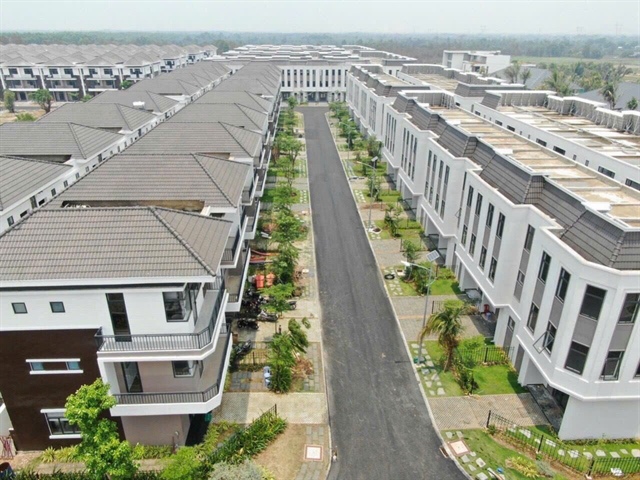Tightening credit for luxury home purchases might rock realty market: Experts
Tightening credit for luxury home purchases might rock realty market: Experts
If credit policies for luxury home puchases were tightened, it could be a shock for the property market, experts have warned.

The State Bank of Viet Nam plans to apply a credit risk ratio of 150 per cent for loans to purchase home worth from VND3 billion (US$126,000) – three times higher than the current ratio, according to a draft circular about limits and safety ratio for banks’ operation recently made public.
The central bank said limiting loans for luxury home purchases aimed to ensure the sustainable development of the real estate market and safety of the banking sector.
According to financial and banking expert Nguyen Tri Hieu, increasing the credit risk ratio would push up lending interest rates for luxury home purchase loans, which would harm the liquidity of this segment.
Nguyen Van Dinh, deputy general secretary of the Viet Nam Real Estate Association, said tightening credit for luxury home purchases could help direct market demand more to the medium segment.
Although the development of the medium housing segment needed to be encouraged, it was not necessary to sacrifice the luxury segment, Dinh said, because the market still had demand for luxury homes, especially from foreigners.
The real estate market and the high-end segment in particular recently did not see any unusual developments, Dinh said, stressing that it was not necessary to tighten credit policy for luxury home purchases.
If this policy for luxury home purchases must be applied, the central bank should consider an appropriate length of time for the policy, he said.
Dinh added that if the policy was applied for a long time, it would seriously affect the development of the high-end segment while Viet Nam was trying to improve infrastructure quality and living standard.
Policy making needs careful consideration to ensure the balanced development of the real estate market, he said.
Nguyen Anh Tuan, deputy chairman of property developer HD Mon Holdings, said that most buyers of luxury homes used banking credit for the purchases, stressing the important roles of interest rates and credit policies in boosting liquidity of housing projects.
Tightening credit policies for luxury home purchases would create a market shock with several consequences amid a slow-down in supply and liquidity, Tuan said.
Tuan recommended that banks evaluate the financial capacity of buyers to decide the loans, instead of applying the policy for the whole high-end segment.
The Viet Nam Real Estate Association proposed the central bank raise an appropriate roadmap for tightening credit for the real estate market.
The association said credit policies could be tightened for land purchases which were mainly for speculation while it was not necessary to tighten credit for housing purchase because housing purchases could stimulate other industries such as construction, cement and steel production.
It was more important to consider the affordability of buyers, the association’s president Nguyen Tran Nam said.
Economist Vo Tri Thanh said tightening credit for luxury home purchases would cause difficulties to developers in the short term, but for the long term, it would help the market develop in a healthier way.
Thanh said that the difficulty of policy-makers was how to promote the market development but at the same time reduce risks.
“Don’t rush to conclude that tightening credit will negatively affect the real estate market. Monetary policy could ensure a healthier development for the market. If there is no strict control, it might lead to bubble burst which would affect the entire economy.”
According to Nguyen Manh Khoi, Deputy Director of the Housing and Real Estate Management Department under the Ministry of Construction, each market segment needed different policies.
The draft policy aimed to prevent overheated development of the high-end segment because this segment was the most affected by crises, Khoi said.
As banking credit for real estate was tightened, Khoi also urged developers to seek other capital sources, such as from buyers, foreign partners and securities and bond markets.
Tightening real estate credit was an opportunity for developers to restructure their products and capital as well as redefining their development strategies, Khoi said.
From the beginning of this year, the ratio of short-term capital used for long-and- medium-term loans was reduced from 45 per cent to 40 per cent and credit risk ratio for real estate loans raised from 150 per cent to 200 per cent.
In the draft circular, the central bank planned to reduce the ratio of short-term capital used for long-and-medium-term loans to 30 per cent in 2021 or 2022.























